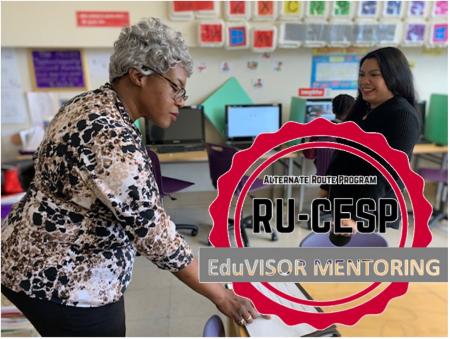Helping NJ Alternate Route Teachers Thrive Results in Micro-credential for Mentors

Mentoring is important to the success of any new teacher, and especially so for nontraditional teachers without student teaching experiences to acclimate them to life in a classroom. That's why more than thirty seasoned educators answered the call to support novice teachers of color as mentors through the Diverse Teachers for Diverse Schools project hosted by Rutgers Center for Efective School Practices and funded by the New Jersey Department of Education. Each mentor spent a year sharing their wisdom, knowledge, tips and tricks with novice teachers who were eager to gain confidence in their new profession. However, this was not merely a buddy system; mentors participated in training and a year-long accountability program as requirements for serving in their roles.
The training, offered in various formats ranging from full-day in-person sessions, a mix of in-person and online sessions, and a fully online asynchronous training option, provided an overview of the mentor handbook “Helping New Teachers Succeed and Persist.” Mentors completed modules to increase their own capacity to help novice teachers with instructional tasks such as writing lesson plans with clear objectives and aligned assessments, differentiating learning for students, engaging students using active learning strategies, and managing relationships with parents. Because of their unique roles as mentors to novice teachers of color, completing cultural competency training was also a condition for mentor eligibility. In addition to training requirements, mentors met monthly expectations for logging their meeting hours, discussion topics and the progress of their assigned novice teachers. Further, they participated in a series of surveys to help advance insights on the experience of mentoring.
While novice teachers stood to gain the most from mentoring, it is clear that seasoned educators reaped rewards as well. Mentors expressed sentiments of being reinvigorated by working with new teachers, enjoying increased opportunities to reflect on their own professional practice, and feeling like valued contributors to a colleague's development.
-
“...the renewed perspective one can gain by viewing our educational system through their eyes!” Asha von Liebtag, Summit High School
-
“...the connections I make while mentoring novice teachers. We reflect upon our practices together and learn from one another. I love to watch as they gain confidence in themselves, their growth, and their abilities to connect with their students." Denise Furlong, Ed.D, Freehold Borough School District
-
“...being able to relate to them on classroom issues or concerns while giving them insight or strategies that will help them grow as educators. Being able to give advice that makes a difference is priceless!” Rita Legband, Retired Teacher
-
“...the opportunity to share with them the kinds of exciting activities and lessons that kids love and remember for years to come. It's also a great incentive to really reflect on my own practices and materials.” Travis Newman, Manalapan High School
At the conclusion of their service, each mentor was awarded an EduVisors Microcredential, also referred to as a digital badge, to recognize their year-long professional learning experience as committed facilitators of novice teacher development. Like other professions, educators can display their digital badge as part of their LinkedIn profiles or other social media platforms supporting badge integration. Once displayed, others can easily click on the badge to obtain details about the conferring institution and associated criteria for earning the credential. This is an ideal way for educators to provide evidence of their accomplishments when interviewing for new positions and seeking promotions or other recognition.
Rutgers Alternate Route is proud of its role in coordinating this mentoring initiative through which deserving education professionals obtain recognition for their accomplishments as contributors to novice teacher development and retention. Additionally, the program is grateful to the New Jersey Department of Education for the grant which made this initiative possible.

 Heather Ngoma has over 25 years of experience collaborating with educators across New Jersey to drive education innovation. She currently serves as the Director of the Rutgers-GSE Alternate Route Program in the Department of Learning and Teaching, a program which helps career changers, recent college graduates, and other aspiring education professionals become licensed teachers in New Jersey. Follow her on Twitter @heatherngoma.
Heather Ngoma has over 25 years of experience collaborating with educators across New Jersey to drive education innovation. She currently serves as the Director of the Rutgers-GSE Alternate Route Program in the Department of Learning and Teaching, a program which helps career changers, recent college graduates, and other aspiring education professionals become licensed teachers in New Jersey. Follow her on Twitter @heatherngoma.





